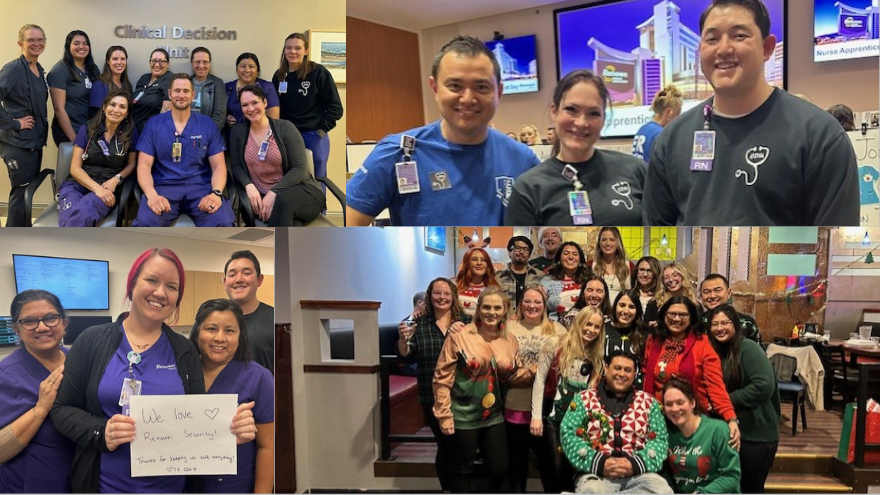Search
Results for 'doctor'
Clear-
Parents, Your Kids Need Flu Shots. Here's Why.
Vanessa Slots, MD, of Renown Medical Group – Pediatrics, explains why getting a flu shot each season can save lives—especially true for the very young and elderly. Why Kids Need Flu Shots The flu is not a passing cold. It is a serious illness that takes lives every year. And this year, flu activity is increasing late in the season. And it happens like clockwork — the onset of an influenza epidemic as fall transitions into winter, and lasts into the spring months. This acute respiratory illness is caused by influenza A or B viruses with yearly outbreaks occurring worldwide. No one is immune, and everyone is susceptible to the flu. Flu Signs and Symptoms: Abrupt onset of fever Headache Body aches and fatigue along with respiratory-tract symptoms including cough Sore throat and an irritated nose Who’s at Risk? Once again: Everyone is susceptible, but children and the elderly are at greater risk of complication from influenza, specifically toddlers less than 2 years. At this age, immunities are underdeveloped. Seniors over 65 are also at increased risk because their immune systems have weakened with age. The severity of a child’s symptoms depend on age and prior exposure to the virus. And with young children, flu is more problematic, since they cannot verbalize certain symptoms like body aches and headaches. As a result, children often experience higher fevers, which can lead to seizures or convulsions. Coupled with gastrointestinal issues such as nausea, vomiting, diarrhea and poor appetite, children are at risk of dehydration and other complications from the virus that can require hospitalization. In fact, an average of 20,000 children are hospitalized from flu each year. Pre-Existing Health Issues Health conditions, including but not limited to asthma, cystic fibrosis, heart conditions, cerebral palsy, epilepsy or diabetes, can intensify flu symptoms. Still, a substantial number of children with none of these risk factors experience severe complications from the flu. How to Protect Your Child from the Flu The best way to guard against influenza is with a flu shot. Children and adults should get the flu vaccine before flu season kicks in — usually by the end of October. Shots are provided as long as flu viruses are circulating and the vaccine is in supply.
Read More About Parents, Your Kids Need Flu Shots. Here's Why.
-
Patty Warren A Woman of Strength and Resilience
Meet and get to know Patty Warren, our featured Sterling Silver Club member this fall. You may recognize her from the latest Senior Care Plus commercial on television, where she joins a coffee chat discussing the many benefits of being a Senior Care Plus member. She’s one of the kindest souls you’ll ever meet – and has a positive outlook on life that we should all strive for. Patty's Story Patty was born and raised in a small Kansas town called Baxter Springs, where she grew up with an older brother, an older sister and two younger sisters. She and her siblings all enjoyed playing sports like softball and basketball, in addition to playing instruments. Patty developed a love and passion for music at a young age that carried into her adulthood. “I wanted to be an opera singer,” said Patty. “I decided to go to college at Pittsburg State University in Kansas where I majored in vocal performance.” After college, Patty moved to Manhattan in New York City to audition to be an opera singer, but she soon realized it wasn’t what she wanted to do after all. She eventually decided to work in the brokerage industry. After living and working in New York for three years, Patty moved back to Kansas where she later met the love of her life, Michael. “In 1992, I had put a dating ad in the local newspaper,” said Patty. “I received over 30 responses, and I went out on quite a few dates.” Then she had her first date with Michael, and the two of them quickly realized how much they liked each other. He asked her to marry him on Valentine’s Day in 1993, and they went on to get married in front of the Justice of the Peace on May 3, just a few months later. “We had a small wedding so that we could move into our first home together,” said Patty. A few years later in 1999, Patty and Michael moved to Arizona, where they lived for 22 years. Patty worked at Edward Jones Investments for 18 of those 22 years and loved her job and the people that she worked with. She retired in January 2021 during the pandemic, and three days later she and Michael moved to Sparks, Nevada.
Read More About Patty Warren A Woman of Strength and Resilience
-
Get to Know Sterling Silver Club Member Hanley Wong
This summer, we’re excited to introduce our featured Sterling Silver Club member, Hanley Wong. You may recognize him from the newest Senior Care Plus television commercial that has been airing locally since last October. Hanley happens to be a former employee of Renown Health and worked in the information technology (IT) department for 13 years. Today, he’s enjoying his retirement here in northern Nevada, with the occasional traveling to visit his family. Looking Back Hanley was born in San Francisco in 1944. He was in the U.S Army Reserve from 1966-1972, having traveled to various places including North Carolina, Salt Lake City, Long Beach, Hong Kong and Taiwan. While he was in the U.S. Army Reserve, he also attended college part-time and graduated from San Francisco State University in 1970 with a degree in business administration, emphasis in accounting. Hanley went into the IT field after he gained computer experience through his accounting background. “I started learning how to program with computers, then became a systems engineer where I did troubleshooting, maintenance and more,” said Hanley. “I’ve always enjoyed the challenging work in the IT field, and I got to meet all kinds of people.” Hanley started his first IT job at a small insurance company in San Francisco. He went on to work for the GAP headquarters and met his late wife there, who also worked for the company. They were married for 40 years and had two sons together. The family moved to Reno 21 years ago when Hanley was recruited by Washoe Medical Center, before it became Renown Regional Medical Center. “My favorite part about working at Renown was the camaraderie in the IT department; it was like a big family,” said Hanley. “I enjoyed making employees happy by solving their computer problems.” In 2005, Hanley was part of the team that helped install Epic, Renown’s electronic medical record system. Through that project, he traveled to a few different conferences and trainings with his team.
Read More About Get to Know Sterling Silver Club Member Hanley Wong
-
Ultrasound Technologist
Sign On Bonus - $10,000Full Time - Eligible for Benefits900331 Pregnancy CenterDay -
10 Facts About Seasonal Affective Disorder
Seasonal Affective Disorder (SAD) is a form of depression linked to seasonal changes. Learn to recognize the symptoms of SAD in your kids (or yourself) should they appear. We checked in with Dr. Vanessa Slots, the Division Chief of General Pediatrics at Renown to help us understand this condition. 1. Blame SAD on the sun—or the lack of it Seasonal Affective Disorder is a more severe form of the “winter blues. Over-sleeping, feeling irritable or unhappy, and withdrawing from people are classic symptoms of SAD. Approximately 90 percent of people with SAD experience depressive symptoms yearly in the fall and winter, while about 10 percent have depression in the spring and summer. The causes of SAD aren’t explicitly known. Still, researchers believe it’s related to a change in circadian rhythms, with differences in the amount of sunlight during different times of the year as one factor. 2. The further north you live, the more common SAD becomes While Seasonal Affective Disorder is predominantly an adult condition, estimates are that one million children in North America have it. Interestingly, SAD does not occur in the tropics. 3. SAD is more recognizable in adults than in children Common symptoms include feeling “empty,” pessimistic, hopeless, short-tempered, restless and not knowing what to do with oneself. Symptoms vary greatly from one individual to the next. SAD is more common in women than in men. When symptoms are severe, physical examinations are required to rule out other medical causes and determine whether antidepressant medication is needed. 4. In teenagers, symptoms tend to revolve around school-related issues Schoolwork suffers, students have difficulty getting up in the morning and arriving late for class, homework is incomplete, and grades may plummet. Afflicted students have difficulty concentrating, remembering details and making decisions. They lose interest in activities that they previously enjoyed. Some teenagers tend to overeat, crave carbohydrates such as pasta and gain weight. Many teachers, school counselors and therapists should be more familiar with Seasonal Affective Disorder.
-
Department Spotlight: Clinical Decision Unit
Entering the emergency room (ER) is intimidating for any person, let alone when you’re unsure what condition or illness you might have. Many may also spend their time in the ER wondering if they will need to be admitted to the hospital. Now, let’s say you don’t need to be admitted. That’s great news! But in order to figure out what’s going on in your body, you may need to stay a little longer – say, under 24 hours – for observation, tests or further treatment. This work is done swiftly by a specific team at the hospital to get you home sooner. That team at Renown Health is the Clinical Decision Unit (CDU). These nursing and acute care professionals seamlessly fill in the gaps between inpatient and outpatient care, helping patients return home sooner through rapid tests and treatment. Quick Interventions for Efficient Care The key goal at the forefront of the CDU’s patient care philosophy lies in their name: decisions. The team makes quick decisions in order to deliver timely, accurate assessments so they can treat patients efficiently and get them home. Not only do these efforts help reduce the amount of time patients have to stay in the hospital, but they also achieve cost savings for both the patient and our health system. And in cases where patients do end up needing to be admitted, the CDU walks them through everything they can expect during their stay. The main duties of our CDU team include: Observation and monitoring, where patients with conditions that are not immediately life-threatening but need closer monitoring Diagnostic testing, including blood work and imaging, to help providers gather critical information quickly Treatment and stabilization to receive treatments like IV fluids, medications or other therapies to prevent the need for inpatient admission Decision-making to determine whether the patient should be admitted for further care or discharged with follow-up plans Think of the CDU as the ER and inpatient admission go-between. By diverting patients who don’t necessarily need emergency intervention away from the ER, the CDU helps relieve high patient volumes and reduce wait times. “The CDU offloads patients from the emergency room who require slightly longer observation status to complete more complex testing or exams,” said Kristine Barnes, RN. “You could consider us a ‘limbo’ unit between the ER and admission to the hospital, if required.” As with many other teams at Renown, every day is different for this team. They enjoy the variety of cases they see and solving the puzzles that present with patient care. "The CDU is always fast moving, with discharges and admissions all day,” said Tyler Cathcart, Acute Care Technician-Advanced. “As an observation unit, we function as both an extension of the ED and PACU, with Medical, Telemetry and post-op patients. We have a wide range of patients and responsibilities to keep the unit moving quickly.” “We see a variety of patients and enjoy the variety each day brings,” added Angie Marrale, Acute Care Technician-Basic. “A day in the life as a tech on CDU is full of surprises because we have such a wide variety of patients. It requires all team members to be attentive, hardworking and communicative in order to provide our patients with the care they need.” If you’re ever looking for an example of a team that moves and acts quickly, the CDU is a shining example of that. Due to their hyper-focused attention, patients are able to embrace better outcomes and higher satisfaction. “We move quickly to get today's group of patients comfortable, complete the tests ordered, make the appropriate interventions and get them discharged back home or transferred in less than 24 hours; then, we refill the unit, and each patient receives excellent, expedited care,” said Tyler Cathcart. “Efficient patient care within 24 hours is our goal, and we strive to meet that goal daily.” A place to get extra care and attention without needing to stay for a long time while also having a team of professionals solely dedicated to figuring out what is going on in your body? Sign us up!
Read More About Department Spotlight: Clinical Decision Unit
-
Faculty - Family Medicine Residency
Full Time - Eligible for Benefits510701 AdministrationVaries -
Department Spotlight: Core Laboratory at Renown Regional Medical Center
When it comes to your health, tests are not only common but often also required to receive the most ideal treatment plan. From your routine urinalysis to more complex hematology cases, these tests help open the doors to proper diagnosis. Thousands of patients are seen at Renown Regional Medical Center every year, which results in thousands of lab samples needing to be processed every day. So, who rises to the occasion? Answer: The Core Laboratory team at Renown Regional. With the largest lab workload in our health system, the Renown Regional Core Lab is where compassionate care meets scientific excellence. While under the care of the Core Lab Team, patients can rest assured that they are in the greatest of hands - literally and figuratively - with every scientist, technical specialist and lab assistant that serves in this department. A Core Mission of Accuracy and Precision At Renown Regional, the only Level II Trauma Center in the region, the Core Laboratory works on a wide variety of lab tests to help providers diagnose, treat and monitor each patient’s condition. Those testing processes, known as “benches,” include: Blood Gas Chemistry & Immunoassay Coagulation Hematology & Differentials Urinalysis Working together in harmony, each member of the Core Lab team has an equally vital role in our health system, and all share a common goal. “Our number one priority is to provide accurate results for our patients, ensuring that the providers have all the correct information they need to treat them,” said Lauren Anderson, Manager of Core Laboratory. As one can imagine, there are several factors involved when it comes to ensuring those accurate patient lab results that Lauren mentioned above. “Throughout the day in the core laboratory, there are many tasks to be performed for the accuracy and validity of our patient results,” said Jackie Blazquez, Sr. Medical Lab Scientist. “The medical lab scientists perform maintenance on the instruments daily while accommodating patient samples and releasing results. Our clinical lab assistants help the scientists with receiving samples, reviewing patient labels for any discrepancies, answering phone calls and assisting with the automated lab sample line.” “The roles and responsibilities will vary depending on the bench assignment, but every bench will have one responsibility in common: performing preventative maintenance on our analyzers and running quality controls afterwards,” added Brittany Oliver-Stergiou, Medical Lab Scientist. From start to finish, there is rarely a dull moment in Renown Regional’s Core Lab. In fact, this capable team can process up to 7,000 samples per day at this hospital alone. "As a Medical Lab Scientist, for each instrument we use, we have to perform maintenance, calibration and quality control to ensure that the analyzer is ready for patient testing,” said Lauren Anderson. “Once the analyzers are ready for patient testing, we perform analysis on the samples, ensuring that the patient's results are consistent with their condition and no errors are found. Between our inpatient and outpatient centers, we run thousands of samples every day, prioritizing and juggling many tasks at once while producing accurate results.” “Right when we get in, we are putting samples on the analyzers, reading results and calling critical alerts or recollects,” added Rosalina Lunsford, Medical Lab Scientist. “Our chemistry analyzers have all the analytes one can think of. Each individual chemistry test that the hospital uses is calibrated, quality checked and reviewed by our chemistry maintenance experts.” Although there are many moving pieces when it comes to the work of our Core Lab experts, these team members work like a well-oiled machine in order to keep patient care at Renown Regional running efficiently. “I start my shift by reviewing my pending worklist and verifying any outstanding STAT tests; then, I track all my untracked samples for easy retrieval, and I'll go through my pending worklist again to make sure that everything is on track for proper turn-around time,” said Lindsey Randle, Medical Lab Scientist. "I'll retrieve anything that may need further special testing, and before releasing results, I will check the sample for any interferences or contamination. This process is on a constant loop throughout my shift in addition to performing analyzer maintenance and quality control testing at timed intervals. This is all done to ensure that we are releasing precise and accurate test results so that patients can receive proper treatment.” “We play a major role in keeping the hospital functioning,” added Rosalina Lunsford. “While the hospital doesn’t see us, we keep patient care moving. Core Lab is not stagnant; it is evolving each day. Tests are being added, machines are being updated and policies are changing. We see hundreds of patient results from different departments throughout the hospital. We analyze, question and conclude many times throughout the day and night.” Think of discovering a diagnosis and monitoring a condition as an ongoing investigation. Our Core Lab professionals are key detectives in the investigation, playing an essential – and often life-saving – role in the diagnosis, treatment and maintenance of each patient’s condition. “Oftentimes, we are the first to detect a patient's problem and escalate it to their provider,” said Lauren Anderson. “For example, looking under the microscope at a patient's white blood cells, Medical Lab Scientists may be the first to see a patient's leukemia and, with the collaboration of our pathologists, ensure that the next steps are taken towards diagnosis and treatment.
Read More About Department Spotlight: Core Laboratory at Renown Regional Medical Center
-
Nourishing Your Loved One Through Cancer Treatment
Eating healthy is a daily challenge for many, but for those with cancer, it is an even harder struggle. A cancer diagnosis affects not only those diagnosed but family members and friends, too. One key area of concern is making sure your loved one stays well by eating healthy food every day. Here are some vital cancer nutrition tips from Jessica Blauenstein, a Board Certified Specialist in Oncology Nutrition and Registered Dietitian at Renown Health. Help to Prepare Meals and Snacks for Daily Cancer Nutrition Make it grab and go. Easy-to-make meals help reduce the burden of having to cook and prepare food. Having easy to grab snacks on the counter or in the fridge can help ensure your loved one has access to those nutrients when needed. Sit outside of the kitchen. This allows your loved one to avoid cooking smells which can make them feel sick as a side effect of cancer treatments. Also try serving them cold foods such as sandwiches, cheese and crackers, or shakes which have a mild scent. Try drinkable meals. Some people with cancer find it easier to sip their calories over the course of 30 minutes to an hour. Consider smoothies or supplemental shakes such as Ensure Complete, Fairlife shakes, Orgain shakes, or Boost Plus to name a few. A great foundation for a smoothie is a protein source (Greek yogurt, protein powder, nut butters or milk) with a carbohydrate (fruits, juice or berries). Add other ingredients as desired, such as spinach, kale, and ground flaxseed or chia seeds to give it more vitamins, minerals, and fiber. Snack Ideas for Those Undergoing Cancer Treatment The following ideas are both quick and easy to make for your loved one. Chicken or tuna salad with whole grain crackers or as a sandwich on whole grain bread Greek yogurt mixed with cereal, fruit and/or nuts Cottage cheese with banana, cinnamon and/or peanut butter Favorite fruit with 100% natural peanut or almond butter spread - Try peanut butter with bananas, apples, or even celery Their favorite veggies dipped in a salad dressing of your choice - For example, carrots with hummus, tahini, or ranch dressing Cheese and whole grain crackers - Add tomato slices with a small amount of avocado, and a dash of oregano on top for more flavor Eggs scrambled with cheese, vegetables and/or salsa Peanut butter and jelly sandwich on whole grain bread A baked sweet potato with some favorite toppings Hard boiled eggs and/or egg salad with whole grain crackers, or as a sandwich on whole grain bread Oatmeal or cream of wheat prepared with milk, fruit and/or nuts Sometimes your loved one may not feel like eating or refuse to eat. If treatment side effects are impacting your loved one’s ability to eat, please visit the websites below containing recipes tailored to treat side effects. Cook for Your Life ELLICSR Of course, you may also consult a registered dietitian and/or the patients care team, if you have more cancer nutrition concerns.
Read More About Nourishing Your Loved One Through Cancer Treatment






